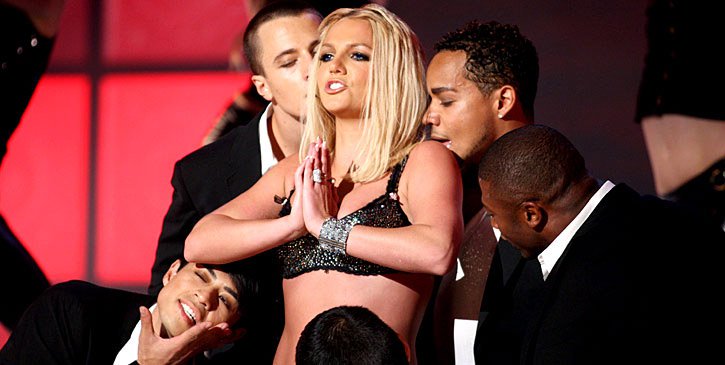Why Britney Spears will always be defined by ‘Blackout’
By Joshua Haigh

Cast your mind back to 2007. It was one of the most memorable years in pop culture history, and one that is constantly referenced a decade later.
There were faded jeans and flip phones, Paris Hilton and Lindsay Lohan were behind bars, and the world’s most famous woman tragically fell into a downward spiral that would go on to change tabloid culture forever.
It’s hard to talk about Britney Spears anymore without referencing her infamous breakdown. While she wasn’t the first star to go off the rails, Britney was the first to have her every move documented for the world to see. After riding high in the charts for six years, she began to buckle under the pressure of constant scrutiny from the outside world, and when her marriage to Kevin Federline began to fall apart, her life quickly descended into utter chaos.
The headlines spoke for themselves: “Britney close to death,” “Suicide watch” and “Britney: A ticking time bomb” to name just a few were plastered all over shop shelves and the internet. Britney was out of control and desperate to escape the life that had been built for her.

When she stepped into a salon on February 16th, 2007 and shaved off the blonde hair that had become synonymous with her brand, the world watched on in complete shock. This was a woman who was plastered on the walls of every teenage boy’s bedroom. The pop star everyone’s dad had a crush on. The singer that every woman wanted to be.
She took ownership of the only thing she still had complete control over, her body, and used it break free of the image music execs had spent millions of dollars moulding her into since she was a child. It was the ultimate “fuck you”, and signified that the old Britney was, to quote Taylor Swift – dead.
Her act of defiance sent the media into a frenzy, and in the months that followed it seemed as if Britney was on the verge of going down the same path as the likes of Amy Winehouse. She lost custody of her children, was filmed being rushed to hospital after a breakdown at her home in the early hours of the morning, and was placed under a strict conservatorship that left her in even less control of her life than before.

Despite the turmoil her life was in, Britney somehow managed to record and release her most critically acclaimed album, which has since gone on to become one of the most iconic pop records ever made, and one that arguably changed the direction of the pop landscape.
Released ten years ago today on October 25th 2007, Blackout saw the star going down a darker, electronic route that fans previously hadn’t heard. Britney was back, she was brunette and she was determined to show that she was no longer the all-American girl next door, but instead a sexually liberated woman who knew exactly what she wanted.
This was an album about getting wasted, going to the club and taking boys home. While this was hardly something new from a pop star, it was the first time it felt like a true representation of the artist. Despite appearing to be anything but on the surface, Blackout truly was the most personal album Britney could have released.
She was living and breathing the lyrics she was singing, and we knew that because the proof was plastered over the front pages of every newspaper in the world falling out of a club on a daily basis.
Its gloriously hazy soundscape paired with her distorted vocals perfectly encompasses that euphoric, almost disorientating feeling that washes over us all at 2am in a nightclub while our favourite song comes on and we see a cute guy eyeing us up.
But there was more to the album that midst the eye. ‘Gimme More’ alluded to the paparazzi’s insatiable desire to witness her downfall, ‘Break The Ice’ and ‘Perfect Lover’ saw her waving goodbye to the innocent virginal teen pop image once and for all, and ‘Why Should I Be Sad’ was the perfect kiss-off to her failed marriage.
Blackout marked the moment Britney, for far too fleeting of a moment, took complete and utter control of her career. In fact, it still stands as the only album she’s credited as an executive producer.
While 2007 marked the fall of the world’s most famous teen icon, it also signified the rise of a superstar we could all relate to. Britney was no longer just a blonde Barbie with perfect abs that all the guys wanted. The image of a woman the media had built into this almost unattainable goddess was crumbling in front of the world’s eyes, and in doing so, it was revealing a side to the pop icon that humanised and endeared her to the public.

We often hear people ask: ‘Why does everyone root for Britney?’ and it’s because, at the end of the day, we were all to blame for what happened to her. We bought the papers, we read the stories, and we got an almost macabre thrill out of wondering what the next headline would be. As a result, that sense of collective guilt has seen the both ourselves and the world’s media agree to a seemingly unspoken pact that Britney is no longer a target.
So, even though it hints at the darkness that shrouded her life at the time, Blackout remains an unapologetic tribute to the one year where she was finally able to make choices for herself, whether they turned out to be right or wrong.
